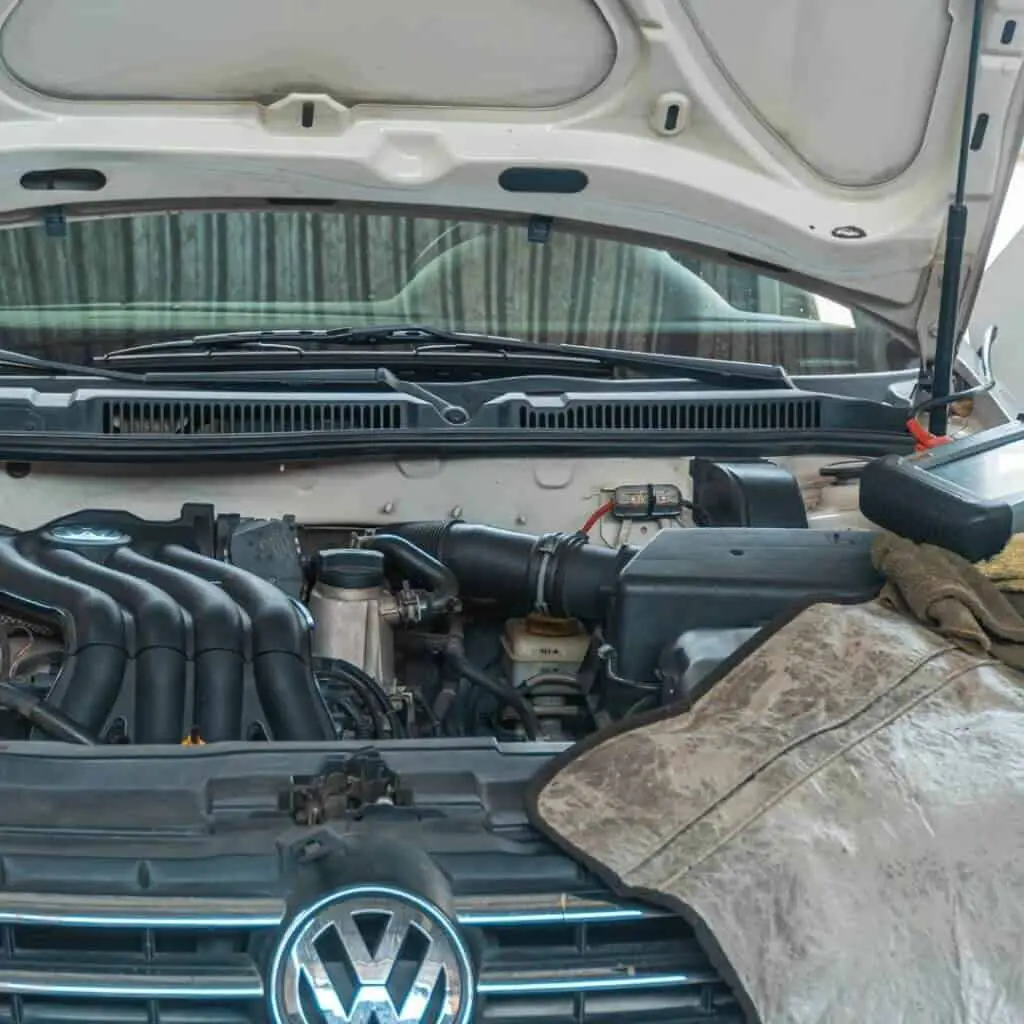Are you familiar with the Genesis GV70 problems?
The GV70 is a mid-sized compact SUV. It comes in two trims. One has a turbocharged 2.5-liter four-cylinder engine while the other is equipped with a twin-turbocharged 3.5-liter V-6 engine.
The four-cylinder engine is the entry-level engine, producing 300 horsepower, while the V-6 produces 375. The car also is all-wheel drive and features a standard eight-speed automatic transmission.
Furthermore, it consists of advanced modern features, including a widescreen multimedia display, a click wheel controller, Apple Car Play, Android Auto, and a 4G LTE WI-FI hotspot. It also has automated emergency braking, pedestrian recognition, adaptive cruise control, and lane-keeping assistance.
However, despite its numerous advantages and standard features, the GV70 has been reported to experience certain problems. These issues range from powertrain issues to suspension and transmission problems.
This article will provide an overview of the most common problems related to the Genesis GV70 and discuss possible solutions.
Most Common Genesis GV70 Problems

The most common issue reported to the National Highway Traffic Safety Administration (NHTSA) by owners of the Genesis GV70 is a concern with the powertrain.
There have also been reports of the GV70, brakes failing, transmission, and suspension difficulties. Other complaints filed include strong criticism of the steering, and gas pedal ergonomics, as well as a complaint about a malfunctioning electrical system.
- Issues with the Powertrain
Any premium vehicle’s motor must be top-notch for a pleasant ride, but concerns about the GV70 powertrain imply it isn’t. The powertrain was the subject of the initial complaint filed with the NHTSA concerning the Genesis GV70 [1].
This car has suffered a lack of power since its launch.
The other concern is regarding the lack of acceleration. The GV70 frequently loses power and stalls, sometimes it’s unable to travel faster than 30 miles per hour on the freeway. The four-wheel drive system has also been reported to disengage and only power the back wheels.
- Transmission Problems
Frequently noticeable Genesis GV70 transmission problems include shifting delays, grinding, or leaping during acceleration. The car also vibrates and produces whistling noises while on the road, as well as a burning smell emanating from beneath the hood [2].
On upshifting and downshifting, the transmission usually makes a nasty grinding sound. Lack of solid maintenance is frequently the root cause of these issues.
Improper maintenance results in low transmission fluid levels, causing a vibration in the gearbox when shifting. If not repaired, it could result in a full gearbox breakdown.
Another issue is trouble with the torque converter. The converter is responsible for transferring energy from the engine to the transmission and is increasingly popular in some current Hyundai models.
Gear slippage is one of the clear symptoms that a torque converter is failing. If your gears are slipping, you may need to replace the torque converter.
Delays in shifting gears are one of the peculiar issues discovered with the Genesis GV70. When you shift gears, you may notice that it takes a second or two for the car to adjust to the new gear.
This is frequently accompanied by spikes in your RPM and loud engine noise, indicating that the vehicle is still in the previous gear. Some components of your vehicle will wear out as it ages.
As the car approaches 100,000 miles, the transmission components begin to wear out. As a result, the vehicle may suffer a combination of the issues explained above.
- Brake Problems
Brake failure is another problem frequently reported with the car. For example, the owners have complained about how the GV70 rocks forward and backward, resulting in a sensation of whiplash for the driver. This causes an unanticipated delay in acceleration, which almost leads to an accident. It also causes unnecessary neck strain.
According to the complaint, it appears to be a problem with the two systems (auto start, stop, and brake hold) interacting with each other. Another concern is about the ergonomics of the brake and gas pedals on the GV70’s top trim.[3]
- Problems with the Electric System
Some GV70 components that normally cause electrical problems include the alternator, starter, hybrid and ordinary batteries, cables, engine harness, coil, ignition switch, electronic ignition, wires, and spark plugs.
The battery is most often the source of any electrical problems in older GV70 cars. Nonetheless, new cars normally have a complex and sophisticated electrical system. A depleted or dead battery is a clear electrical issue.
However, don’t just replace the battery without first checking for any other electrical problems in the car. When the alternator, battery, or other electrical system components fail, drivers frequently face a variety of problems. [4]
- Suspension issues
A car suspension system functions to lower friction between the road surface and the tire of the vehicle, improving passenger comfort, and offering steering stability. Suspension components include springs, shock absorbers, anti-roll bars, control arms, and other parts.
Every day, they endure a beating from potholed streets, train tracks, rain, snow, road salt, gravel, filth, and grime. The most recurrent suspension issue is improper wheel alignment. The wheels must be properly directed and aligned. If they aren’t, your steering will be off-center, which will result in uneven tire wear.
Other components which are prone to problems include shock absorbers, springs, struts, ball joints, and control arms. Shock absorbers contain a fluid that dampens bouncing, and when they begin to leak, suspension performance degrades.
Your vehicle springs are a crucial component of your car’s suspension. They support the weight of the vehicle, and as they wear, they might slump or break.
As a result, you may hear clunking noises over bumps, and the car might not even corner confidently because it’s unable to control the weight it is bearing. [5]
- Steering problems
The common steering problem with GV70 is trouble when turning the wheel, especially at rest or low speeds. This could be due to a power steering malfunction, a low power steering fluid, a fluid leak, or worn parts.
Sometimes there are grinding sounds. These could be due to a problem with the steering gear or worn or damaged parts.[6]
Vibration or shaking of the steering wheel is another issue. Vibrations might worsen over time, especially when turning or driving at high speeds. Severe shaking can make driving difficult and increase the danger of an accident.
The car also normally experiences drifting or tracking problems. The vehicle tends to steer to the left or right and does not follow a straight route, or is slow to return to the center. When this happens, the driver loses control, which increases the likelihood of an accident.
Solving Genesis G70 Issues
The best approach to remedy most of these problems is to have your vehicle serviced and maintained frequently and to update the software whenever available. You will need to service your vehicle every couple of thousand miles.
To ensure that the service is complete, it is crucial to consider the transmission. You should have the transmission inspected regularly to ensure that all the components are in functioning properly.
As you may have realized, low transmission fluid level is one of the primary causes of Hyundai GV70 transmission difficulties. You must devote significant time to car maintenance. And if the problem persists, you may be required to replace the transmission.
For the suspension, brake, and steering problems, these components must be serviced regularly and any worn-out equipment in them replaced. Also, the battery and other electrical accessories should be examined to ensure proper operation.
Read Next: Subaru XV Problems
Conclusion
Although Genesis GV70 is a powerful car, it has experienced some serious problems since its production. The most common concerns are related to the powertrain.
Drivers have experienced a range of problems, including transmission and suspension complaints, errors in the brake control system, and general power loss and stalling.
Some of the problems are experienced immediately after purchase while others will only occur after many years of operation. If the issues are corrected early enough, they will not affect the overall reliability of your GV70 car.
If appropriately maintained and driven conservatively, this car can last between 200,000 and 250,000 miles on average. This indicates that a GV70 should last 13 to 17 years before repair costs become uneconomical.
Read Next: Porsche Cayenne Years To Avoid




